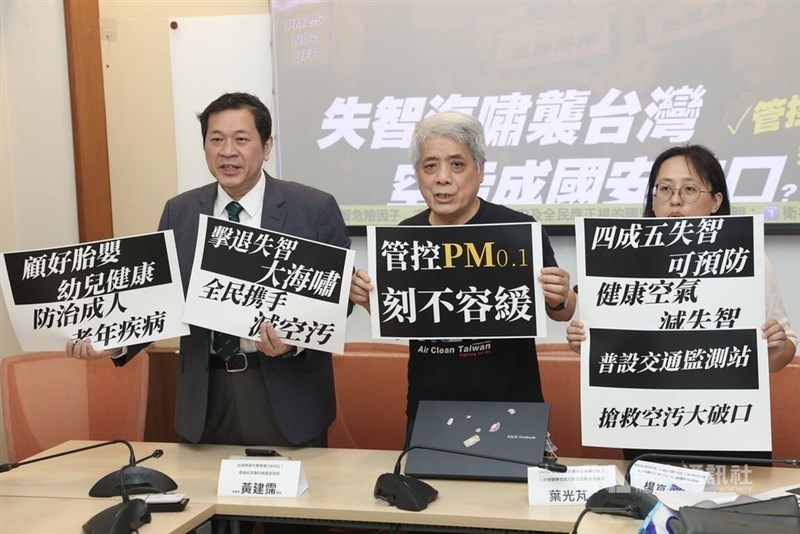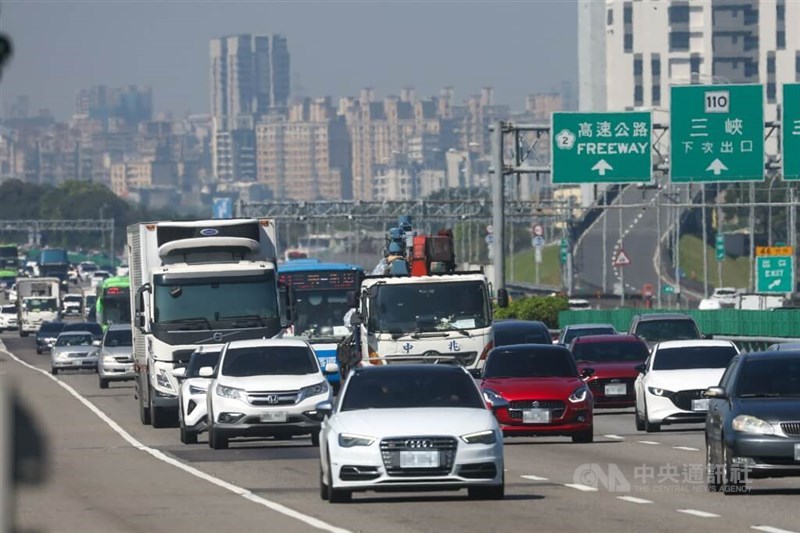
Taipei, June 24 (CNA) NGOs and medical groups on Tuesday urged Taiwan's government to strengthen air pollution monitoring, warning that exposure to pollutants such as PM2.5 pose a serious risk of dementia and other major health issues.
Air pollution is one of 14 modifiable risk factors for dementia, according to a 2024 report by The Lancet, an international medical journal, said Wu Hsi-lin (巫錫霖), former president of the Taiwan Neurological Society, at a news conference in Taipei.
He said that long-term exposure to air pollutants such as PM2.5 and nitrogen oxides has been proven to cause inflammation in the brain and oxidative stress throughout the body.
"Such exposure further leads to neurological degeneration and a decline in cognitive function," said Wu, who attended the event via video link.
"This type of environmental stress [from air pollution] particularly affects urban populations and the elderly," Wu said. "Since Taiwan has already become an aging society, the issue deserves even greater attention."
Huang Jian-pei (黃建霈), secretary-general of the Taiwan Association of Obstetrics and Gynecology, said raising awareness about air pollution in Taiwan was important. "We can choose not to smoke or drink, but we can't choose not to breathe."
Huang noted that traffic-related air pollution occurs across all metropolitan areas -- the most densely populated parts of the country -- meaning its impact on public health is "especially significant" in those regions.

"Without proper control measures, we can expect not only an increase in dementia cases, but also a rise in various other diseases," Huang said, adding that air pollution was also a potential factor in many of Taiwan's leading causes of death.
Kuender Yang (楊崑德), vice superintendent of MacKay Children's Hospital, said interactions between genetic factors and early-life environmental exposures were the most common cause of adult diseases.
Yang said conditions such as diabetes and cardiovascular disease, both among Taiwan's top 10 causes of death, may be linked to air pollution, with their root causes potentially tracing back to environmental exposure during the fetal and early childhood periods, the most vulnerable stages of life.
To help monitor pollutant levels across Taiwan, Yeh Guang-perng (葉光芃), founder of Air Clean Taiwan, said the government should prioritize a widespread installation of air pollution monitoring stations near traffic hotspots and begin regular surveillance of ultrafine particles such as PM0.1, which are not yet covered under existing monitoring systems.
Of the 78 air pollution monitoring stations nationwide, only six are designated for traffic monitoring, while only two -- located in Taipei's Datong District and New Taipei's Sanchong District -- are situated next to major traffic hotspots, Yeh noted.
"We don't even know what we've been breathing when it comes to traffic pollution -- there isn't a single air pollution monitoring station [near traffic hotspots] between Taoyuan and Kaohsiung," Yeh said.
The public should be encouraged to adopt "active transport" options such as walking and cycling, which rely on human power rather than polluting, energy-consuming vehicles, Yeh said.
If that is not feasible, people should take public transportation instead of private cars, he said, adding that the government should step up efforts to promote "active transport," improve related infrastructure, and enhance the accessibility of public transit.
- Politics
Court hears arguments in cases against ex-Taipei Mayor Ko Wen-je
12/15/2025 11:08 PM - Politics
Ex-Taiwan Manila envoy reflects on efforts to mend ties after fatal shooting
12/15/2025 10:05 PM - Politics
Premier defends refusal to enact spending plan, draws opposition ire
12/15/2025 10:05 PM - Politics
China-Japan situation reflects 'wolf warrior' approach: Taiwan diplomat
12/15/2025 06:44 PM - Cross-Strait
Taiwan deeply regrets Jimmy Lai conviction under HK national security law
12/15/2025 06:13 PM